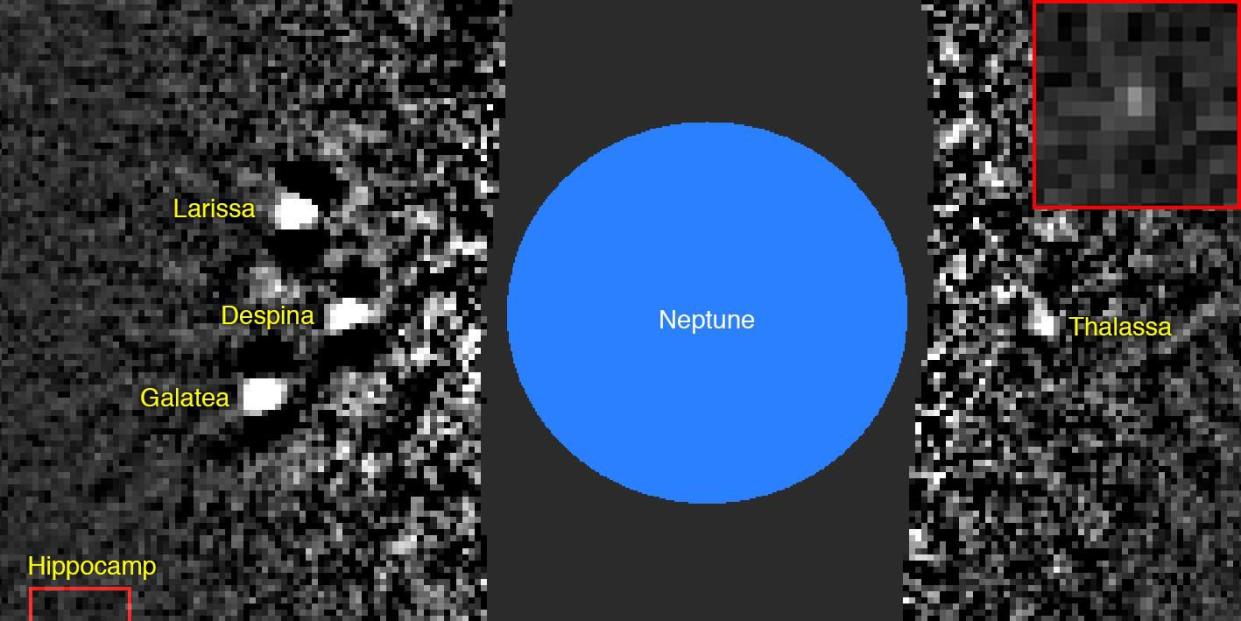Hubble Found a Brand New Moon of Neptune And Nobody Realized It

• Neptune had 13 known moons, including six small ones discovered by Voyager 2 in 1989.
• Scientists were studying old Hubble Telescope pictures of the planet's moon and rings when they discovered a tiny new moon called Hippocamp, the 15th known moon.
• Hippocamp is named for a sea monster in Greek mythology. That makes sense, since Neptune is the god of the sea and all of its moons have been named for water-related deities.
Neptune has been hiding something. Near a group six smaller moons discovered in 1989 is a seventh one, called Hippocamp, that was just confirmed to be the 14th moon around the blue gas giant.
Hippocamp has a strange and curious history. Here's the tale of its peculiar origin, and how it managed to hide out for so long.
Lost in Space
The new moon is only 21 miles around. But if the new study in Nature led by Mark Showalter of the SETI Institute is right, it may have a rich history: Hippocamp could be a chunk of Proteus, the second largest moon of Neptune, that was blown off the bigger by a comet. In fact, Showalter says, Hippocamp may live in Proteus' original orbit.
But let's back up for a moment, to the Voyager 2 flyby of 1989 that gave astronomers their first up-close look at the eighth planet. Scientists had known since the 1800s about Triton, Neptune's colossal moon with a backward orbit. We now know that Triton is a wayward object from the faraway Kuiper Belt that was captured by Neptune's gravity-a celestial event that wiped out the planet's original moon system. The subsequent collisions following Triton's arrivel created the six inner moons that Voyager 2 detected 30 years ago.
Hippocamp marks the seventh inner moon. But Showalter and his colleagues weren't moon-hunting when they began to look at Hubble Space Telescope data about Neptune. Instead, they were trying to understand the interactions between the existing moons and a series of semi-rings called arcs, which were also discovered around Neptune in 1989.
"It was always in the back of our minds that there might be the possibility of discovering a small moon out around Neptune, but we didn’t expect to find one out in this location," Showalter says.
It was found by taking Hubble data starting in 2004. When the images are distorted in a particular way, the points of light that represent small moons become more apparent-it's easier to follow their orbit by smudging an image to bias their brightness. There was one mysterious light source in there, unmistakably a moon, but smaller than anything else out there.
What's In a Neptunian Name
Once the new moon was confirmed, its finders needed a name for it. Because Neptune is named for the god of the sea, its moons have always carried ocean-related names. Showalter, an avid scuba diver, has a fondness for sea horses. A hippocamp (or hippocampus) is a mythological sort of mer-horse (horse face and torso, fish lower half) that would go on to give the real-life sea horse its scientific name.
"When I realized that Hippocamp was a reasonable choice compliant with the IAU and that I can honor sea horses which i have enjoyed seeing over the years, it seemed like a good choice," he says.
Just a Little Guy
It'll be hard to make out any details about Hippocamp itself, given its small size. The best way to study it would be a mission to Neptune, which is gaining some currency within NASA, though there are no set-in-stone plans yet. If a space probe ever does visit planet eight, it could find even more, smaller moons beyond the limits of what Hubble can see.
"I don’t think it’s going to be easy to find anything else out there," Showalter says. "We’re kind of at the limit of what Hubble can do at this point."
There's plenty to explore there anyway-geysers on Triton, a giant blue storm on Neptune, a complex ring system, and 14 under-researched moons-so we might as well get on with getting out there already.
('You Might Also Like',)

